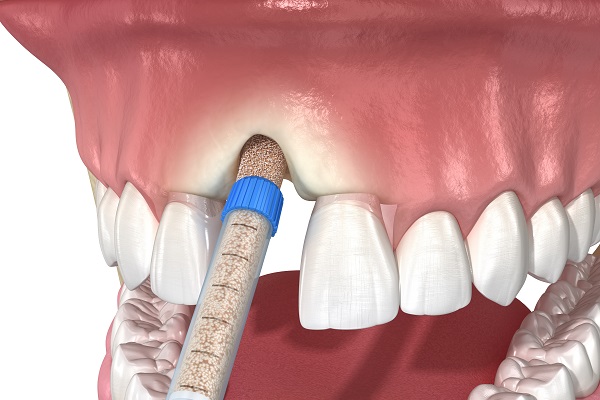Bone Grafting FAQs

When considering dental implants, your dentist may bring up the possibility of bone grafting if they believe that your jaw bone is too thin or soft to support the implant as is, which may cause the implant to fail down the line. Bone grafting is a basic surgical procedure done in the dental office to augment the bone.
Frequently asked questions
Below are some frequently asked questions about bone grafting.
How does bone grafting work?
Performed under local anesthesia, the grafting material is placed into the space left by a missing tooth. Afterward, the body will form new bone cells to replace the graft material gradually over several months.
Why may the procedure be necessary before dental implant placement?
Typically, dental implants should survive a lifetime, but this can only happen if the implant fuses firmly to the jawbone. If there is inadequate bone mass, the success rate of the implant procedure diminishes significantly. Low bone mass happens because the quality and quantity of the bone usually degrade when a tooth becomes missing, although the occurrence is hardly noticeable.
In some situations, when the person is ready to get the dental implants, the remaining bone may not be enough to support the implant. This is the reason bone grafting is necessary. The best choice is to replace a lost tooth as fast as possible and why dentists recommend bone grafting after tooth removal.
What is the source of the grafting material?
The dental expert may obtain the graft material from different sources, including your body. Recently, though, the grafts use synthetic materials and lab-processed bone from a human or animal donor (often a cow).
How safe is bone grafting?
There are no safety threats regarding the grafting material sourced from another part of your bone. However, the drawback of the method is that it requires creating another surgical site: the location where the bone is taken. Mineral bone replacements taken from animal bone or human donor have a minimal threat of infections because they are adequately screened.
The risk level for the two is similar because of the comprehensive and meticulous processing done at the trusted tissue bank. The result is a graft material that is totally safe. The mineral graft materials do not exist independently in the body but naturally dissolve and dissipate into the bone with time.
Is the procedure painful?
The dentist has to create a small incision in the gum to reach the bone under it. This means that you may suffer minimal soreness after the operation. The easiest way to reduce the pain is to apply ice packs on the jaw and use over-the-counter anti-inflammatory drugs and possibly pain relievers.
How long does healing take?
You should be good to go with a day or two. However, the bone regeneration process is only just starting at this point. Within the next few months, your body will keep depositing new bone cells and eliminate the grafting material.
Can the body reject the graft?
This does not happen because the material contains only minerals and no living or genetically coded element. The primary concern is the amount of bone that the body will form as a result of the graft. If the required bone mass is not attained when the graft has fully healed, additional grafting material may be added when placing the implants.
Call us today
If you have more questions about bone grafting, call us today so we can provide you with the information you need.
Request an appointment here: https://www.stratford.premieroralsurgeryct.com or call Premier Oral Surgery & Implantology Center at (203) 760-0190 for an appointment in our Stratford office.
Check out what others are saying about our dental services on Yelp: Bone Grafting in Stratford, CT.
Related Posts
Impacted teeth are a common dental condition where a tooth fails to fully erupt into its proper position in the mouth. This can occur due to crowding, abnormal growth angles, or obstruction by other teeth. Oral surgery, performed by specially trained oral surgeons, plays a critical role in managing impacted teeth, especially when complications arise…
An apicoectomy helps save a tooth when root canal treatment alone cannot resolve infection, and many patients wonder how long it takes to heal after an apicoectomy. Clear expectations about recovery reduce anxiety and support better outcomes. An endodontist reviews the procedure, provides aftercare instructions, and tailors the plan to each patient so the tooth,…
A single tooth implant can replace a natural tooth with a titanium rod and an artificial crown. It is custom-fit to fill the dental space after losing a tooth. Knowing more about this dental replacement can help you prepare for your next visit. Here are the details on how a single tooth implant can enhance…
A sinus lift procedure goes by many other names, including sinus elevation, sinus augmentation, and sinus graft. It can be an important step in the process of having a dental implant placed in the upper jaw to replace a missing tooth. The procedure involves raising the floor of one of the maxillary sinuses and filling…
